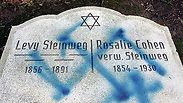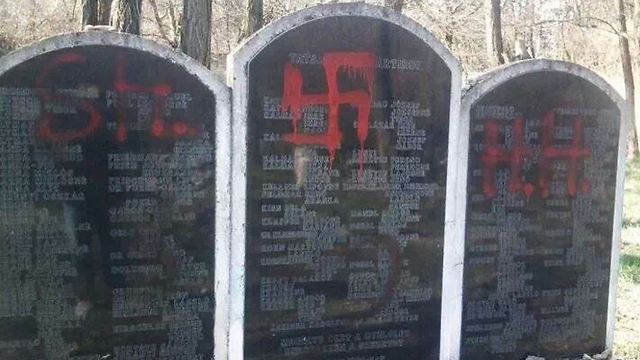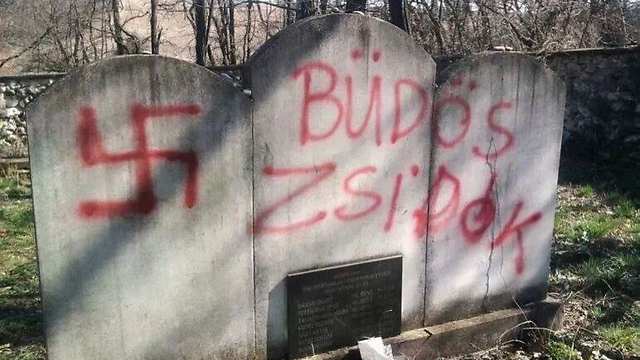
Anti-Semitism on the rise in Europe, report finds
Gains by far-right parties show anti-Semitism becoming widespread in Europe, though the number of violent attacks against Jews have dropped.
Researchers of the Kantor Center at Tel Aviv University recorded 554 violent anti-Semitic acts in 2013, including attacks on people and vandalism against synagogues, cemeteries and other Jewish institutions.
The researcher's main conclusion was that the anxiety felt by Jews does not necessarily stem from an increase in the actual number of violent incidents, but rather from the increase in abusive behavior and insults, threats and harassment, a press release issued by the researchers stated.
The figures reporting on the number of violent anti-Semitic attacks showed a 19 percent drop compared to 2012, when a deadly shooting at a Jewish school in Toulouse, France, sparked a series of copycat attacks.
Related stories:
- Netanyahu: Hamas is trying to start another Holocaust
- US decries anti-Semitic flyer in Ukraine
- Far-right makes major gains in Europe in last decade
Despite the decline, there is a steady increase in the number of direct attacks against Jews, the report read, adding that most direct attacks go unregistered: The majority of Jews who have been subjected to anti-Semitic attacks, both verbal and physical, do not report them to authorities. This finding prompted the researchers to conclude that that the situation is in fact more dire than that which is reported by Jewish communities and law-enforcing agencies
In addition, the number of attacks in 2013 was similar to that recorded in 2011 and over the last 10 years – a much higher average than the 150-200 cases that occurred between 1994 and 2004.
Like last year, France had the highest number of incidents, 116. More than one third of attacks globally were directed at people.
Regarding the findings of the report, which were a result of a survey that examined the reactions among European Jews about anti-Semitism, the researchers noted that they "point at an intensified feeling that personal safety and communal wellbeing are jeopardized". It was further noted that the situation is particularly severe in countries such as Hungary, France and Belgium.
The report is released yearly ahead of Israel's Holocaust Memorial Day, which begins Sunday evening.
The report warns that racist and anti-Semitic attitudes are becoming more acceptable, particularly among European youths.
One example the report raised is the quenelle, an inverted Nazi salute popularized by a controversial French comedian. It has been made in front of sensitive sites, such as Anne Frank's home or Nazi concentration camps.
"This infection of public anti-Semitism is going on and spreading all over," said Moshe Kantor, president of the European Jewish Congress, an umbrella group representing Jewish communities across the continent. "Ten years ago, who would have imagined someone doing the quenelle in front of the gates of Auschwitz?"
Kantor also expressed concern over the increasing popularity of far-right parties, especially in France, Hungary and Greece, where they are expected to make big gains in European Parliament elections next month.
He said his organization was urging European governments to enact more legislation and educational programs to combat racism.
Kantor also mentioned the situation in Ukraine, where Jews are caught in the middle of the conflict between nationalists and Russian separatists, with both sides using anti-Jewish rhetoric while accusing each other of harboring anti-Semitic supporters.
Associated Press contributed to this report












